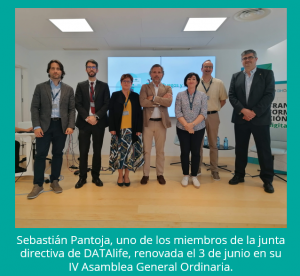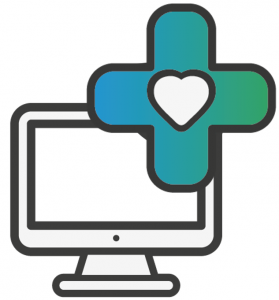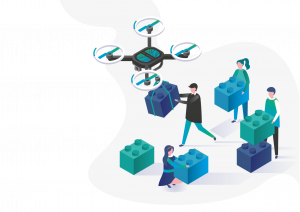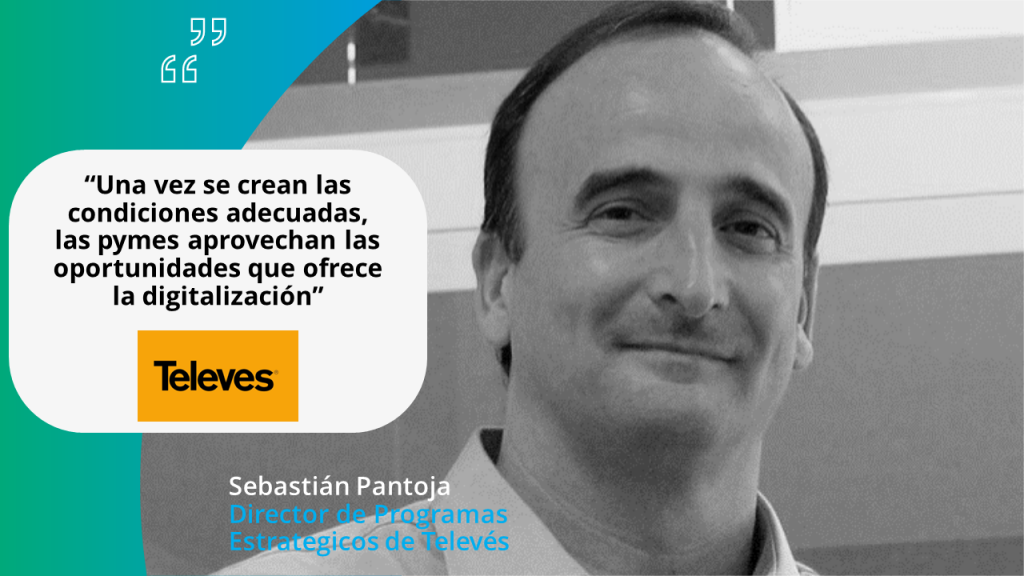“Once the right conditions are created, SMEs take advantage of the opportunities offered by digitalization”
If we take a look at the partners that are part of the DATAlife, we can find entities of the Televes level. It is, without a doubt, one of the companies that have the most say in the development and manufacture of telecommunication solutions. Since 1958, it has evolved from antenna to more advanced fiber optic networks in buildings and homes. It has also diversified its technology towards solutions for connected LED public lighting networks, advanced socio-health telecare for our elderly at home or residences, or the development of the Connected Hotel through personalized audiovisual services.
On this occasion, we have shared a few minutes with its director of strategic programs, Sebastián Pantoja. He spoke to us as part of one of the driving companies of DATAlife, committed for more than 50 years to manufacturing quality through avant-garde and innovation and, above all, to the digitalization of the Galician ecosystem.

We want to take advantage of this interview to show off our partner. Having Televes in the hub is a luxury for the team and for our SMEs.
Thanks a lot! Our mission within DATAlife is that of a tractor company and we want this to translate into real help. We want to work and get involved in the whole digitization process. We take it very seriously because it is a vital issue for the development of our region.
Personally, I am clear that it is very important to have agents like this Hub that help you make that transition. In this scenario, Televes wants to set an example and show solutions that we have in place and that can help them.
But the concept of SMEs is so broad… Almost impossible to narrow. That is why we would like to know in what state those that come to you are. ¿Do they know what they need, do they need advice?
There are two types of SMEs. On the one hand, there are those who want to be more competitive and see digitalization as a necessity, but are not very clear about how to put it into practice. In this case, it is vital your service of Trace the route in which the partners do consulting work and land the digitalization in your specific case.
Others, however, are in another state. They have already developed their digitalization and what they want is to continue improving and gaining competitiveness.
Do you perceive any sector of SMEs especially active in this of getting on digitalization?
I don’t think one value chain is more concerned about digitalization than another. Actually, I think they all are. Another thing is that their day to day allows them to prioritize it or reach them all the necessary information.
In my experience, once the right conditions are created, everyone takes advantage of the opportunities offered by digitalization. Proof of this is, for example, the agri-food sector that is having an enormous interest in this process and I am sure that it is due to the work done from DATAlife. Now we are working digital proposals for this value chain. Information arrives, advice, the advantages are understood and join this process; It’s always like that..
 On the other hand, you have a very active business area that is linked to the social and health sector. How is it evolving?
On the other hand, you have a very active business area that is linked to the social and health sector. How is it evolving?
Since we launched it, back in 2014, it is in high demand. It is not surprising that this is the case, because it responds to a very specific need. The social and health sector is one of them in which digitalization is a necessity.
This is relatively recent. It is true that the health part has assumed the need to bet on digitalization; However, in the care part, this did not happen. Until now, 100% of the process was very manual, very focused on the accompaniment of people. But in this model it is necessary to use digitalization to make it competitive and sustainable.
We are facing the perfect storm: we have an aging population, geographically dispersed and limited care resources. It seems that the only tool is digitization.
Yes, definitely. The key is to change the concept: to move from focusing solely on the cure of the disease and broadening the look to care. When we do, we realize that, in Galicia, the only way to provide sustainable social and health care is to do so through digitalization.
The WHO itself has stopped defining a healthy person as one who does not have a disease. Today there are many people who have chronic diseases, but, with proper care, lead a perfectly normal life. Really, a healthy person is one who can have an independent life. Health and functional capacity become united. It’s not just a change of definition, it’s a change of approach.
“In Galicia, the only way to provide sustainable social and health care is to do it through digitalisation”
In this scenario that we face globally, Galicia can be a perfect testing base.
We are a perfect “living lab”, we have all the necessary features to test care systems for people. Our environment exactly reproduces the challenges we will face in Europe in 2030.
And within the social and health sector, who is especially active in this digitalization?
Currently there is a lot of activity, especially in the Consellerías de Política Social. Mainly by those responsible for providing this care. They are the ones who have suffered the most during the pandemic and have registered very high mortality figures. In addition, to this we have to add that we have the Next Generation funds that are very focused on improving this area.
We are really entering another stage. Until now we saw that, in the area of health, hospitals had prior knowledge of technology and, at the level of innovation, they had always been very receptive, but now the time has come for the care part. It is very important to give the same importance to the word care and to cure, a vital change that opens doors to digitization with capital letters.
We always like to ask companies like Televes, which reach far beyond national borders, how we are seen outside. Are our SMEs competitive?
Contrary to what we might think at first, the problem of digitalisation and SMEs is a problem at European level and is defined by Europe as one of the most important challenges facing our continent. It is not a local issue.
Our view is distorted because, when we talk to small international companies, we usually talk to high-tech SMEs that have transcended the national level. This is why German SMEs tend to be thought of as super tech. But it is not true, we also have highly digitized internationalized SMEs.
And now tell us, Sebastian, where do you have your eyes? 
I am attentive to several sectors that I think will give surprises and joys in the future. Undoubtedly, to that improvement of care through technology, as we have spoken. But I also love following what is being done at the Rozas Airborne Research Center (CIAR), which is making great strides in the field of drones.
In addition, I always remain attentive to what the Galician Agency for Rural Development (AGADER) does around smart villages. Territorial dispersion, which until now was understood as a weakness, from Europe has ceased to be seen as such. The current urban density conflicts with the quality of life and is being promoted to fill the territory more broadly. But, for that, it is necessary to provide the tools and services that we have now in the cities.
Last question. We know that Televes is always “plotting” something with the academic environment. Can you tell us about any of your projects?
That’s true. Right now we have a wonderful project with the USC: intelligent lighting, Cromalux. This consists of using the light projected on a monument not only from an ornamental point of view, but as a way to slow down the growth of the microbiota and reduce the cost of maintaining the monuments. In addition, it is based on LED, which represents an energy saving of 80%.
This is a reality, the results of the pilot have been very good and the City Council of Santiago is considering taking it to other monuments. It’s completely groundbreaking, but we’re going to introduce it to 15 World Heritage cities and we think it can work very well.

